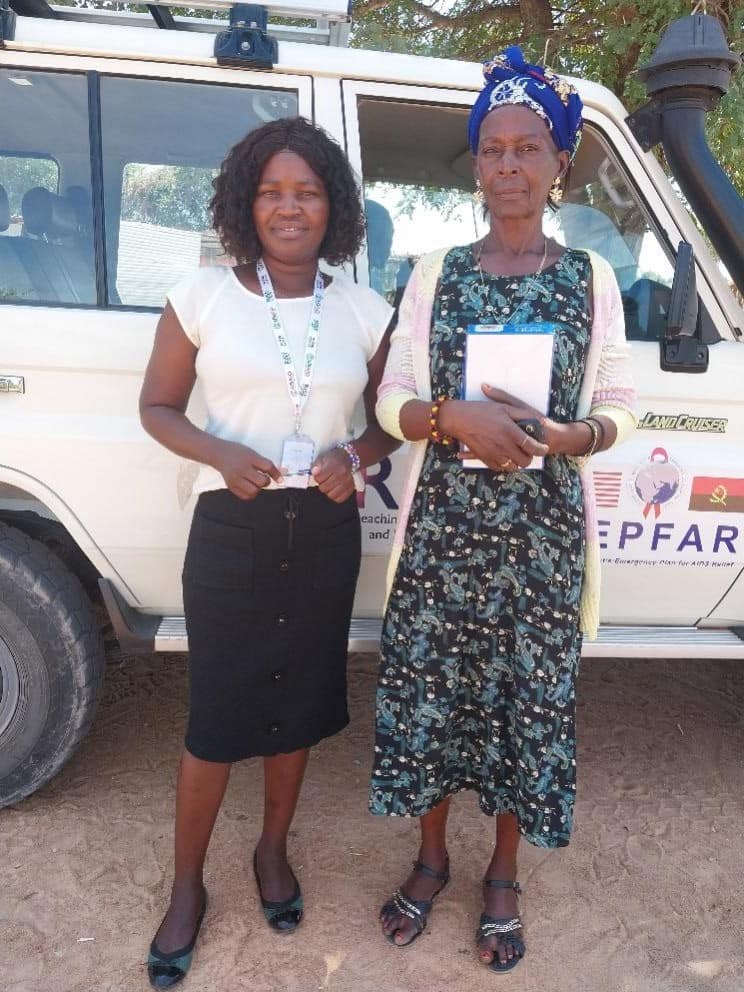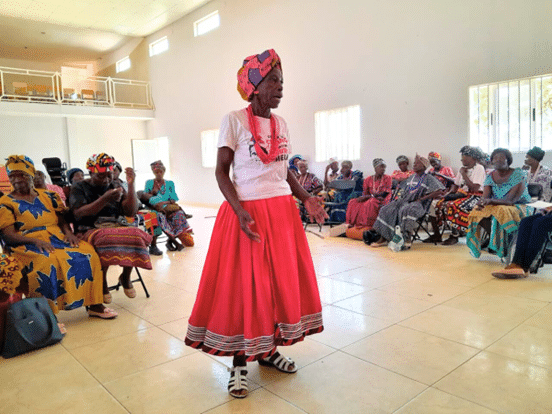Meet Ana Fernando, a vibrant 33-year-old new mother living in the southern province of Cunene in Angola. Over a year ago, Ana made a fateful decision: she stopped her antiretroviral treatment (ART) for HIV. Countless women like Ana encounter challenges that stand in the way of ART adherence – from missed health facility appointments, long distances to health facilities, stigma, and even food insecurity. In Ana’s case, she didn’t want her neighbors to find out why she needed to go to the health facility. In addition, with her partner living and working in Namibia, travel as a mother was difficult. So she stopped her treatment. ART adherence is essential not only for suppressing viral load in a person living with HIV, but also for preventing vertical transmission of HIV to a child during pregnancy, labor, delivery, and breastfeeding.
Thanks to a traditional birth attendant (TBA), Paula, Ana received the support she needed to re-start ART and have her child tested for HIV.
In Angola, 54 percent of women living with HIV ages 15 and older, and 22 percent of children living with HIV ages 0-14, are on ART. For pregnant women living with HIV on ART, the estimate is much higher at 80 percent, yet still much lower than most countries in sub-Saharan Africa. Realizing the crucial role TBAs play in Angolan communities, the Reaching Impact, Saturation, and Epidemic Control (RISE) project, supported by the U.S. President’s Emergency Plan for AIDS Relief (PEPFAR) through the United States Agency for International Development (USAID), is collaborating with TBAs to improve linkage to HIV health services for women and children through a referral partnership between TBAs and RISE HIV counselors.
TBAs are typically older women who deliver babies directly in their own communities. Often, they have honed their skills through years of apprenticeship and knowledge passed down between generations. Incredibly valued and respected, TBAs have the trust of traditional authorities, such as religious leaders, as well as the women they serve, who value the one-on-one care specific to their needs.
Recently, RISE/Angola organized a meeting with 66 TBAs from the three major target municipalities in Cunene province where PEPFAR works – Namacunde, Ombadja, and Cuanhama – to establish this partnership.
The aim of the referral partnership is to foster communication and support between RISE HIV counselors and TBAs, two roles that have not necessarily worked together hand-in-hand previously, to ensure women living in rural communities do not miss essential antenatal care visits. These visits are vital for HIV testing, access to ART if they test positive, and other essential health services. During the meeting that occurred in March 2024, RISE gave TBAs an understanding of the importance of HIV testing, encouraging referral of community members to RISE HIV counselors based on specific risk criteria. This includes women who missed antenatal care visits, women of known HIV-positive status not on ART, newborns whose mothers missed antenatal care visits, and pregnant women or infants with noticeable poor health. At the meeting, TBAs were introduced to RISE HIV counselors working in different communities, who are the main points of contact for TBAs referring individuals for HIV testing.
TBA Paula, 64, originally from the municipality of Ombadja, serves Cunene community members in Angola and collaborates with RISE to help improve the odds for pregnant women.
“Being a traditional midwife in Vila do Xangongo since 2001, I have had several experiences with pregnant and lactating women,” Paula said. “I know that many of them do not adhere to prenatal services, and many children even contract HIV. This motivated me to get in touch with the RISE counselors for HIV screening for pregnant and breastfeeding women – to rule out the possibility of one of these children contracting HIV.”
“By not knowing the information,” Paula added, “they put their lives at risk.”
“Traditional birth attendants are often the eyes of their communities,” said Ana Diaz, chief of party for the RISE/Angola project. “They have vital local knowledge about the communities they serve that can be used to ensure women receive the care they need. We hope that by establishing this referral system of communicating back and forth, we can continue this amazing progress we’ve already seen after meeting just once to sensitize traditional birth attendants on what we are looking for.”

RISE provincial program officer Ruth Bernardeth (left) and TBA Paula (right) meet in Cunene province.
In addition to Ana Fernando, Paula referred four other pregnant women who had missed antenatal care visits. Upon a visit from a RISE HIV counselor, all tested negative for HIV. Paula also referred a fellow TBA from the community of Peu-Peu, who tested positive for HIV, and was accompanied by a RISE HIV counselor to the health facility to initiate ART. Another TBA, Beatriz, who lives in the nearby community of Mongua, referred eight additional individuals for HIV testing, including pregnant and lactating women, a male partner of a woman known to be HIV-positive, and two TBAs who had recently delivered babies of HIV-positive women, all of whom tested negative.
“It’s been great to work in collaboration with midwives and TBAs,” said Metódia Ndeituelao, an HIV community counselor for RISE. “I, in particular, have already received several referrals from midwives and TBAs, two of which had a reactive [positive] result, and two patients who had interrupted treatment and that I managed to get to return to care and treatment.”
This chain of referrals – based on the valuable local knowledge of TBAs – is essential for connecting with hard-to-reach individuals, particularly those in remote communities who may be unaware of how to access HIV testing services.
RISE/Angola is in the process of mapping by municipality, commune, and neighborhood the areas in which each TBA serves – developing a directory of names and contact information – to strengthen the referral partnership with RISE HIV counselors serving the same areas, as well as to better understand any areas with gaps in HIV health service coverage.
About ICAP
A major global health organization that has been improving public health in countries around the world for two decades, ICAP works to transform the health of populations through innovation, science, and global collaboration. Based at Columbia Mailman School of Public Health, ICAP has projects in more than 40 countries, working side-by-side with ministries of health and local governmental, non-governmental, academic, and community partners to confront some of the world’s greatest health challenges. Through evidence-informed programs, meaningful research, tailored technical assistance, effective training and education programs, and rigorous surveillance to measure and evaluate the impact of public health interventions, ICAP aims to realize a global vision of healthy people, empowered communities, and thriving societies. Online at icap.columbia.edu








